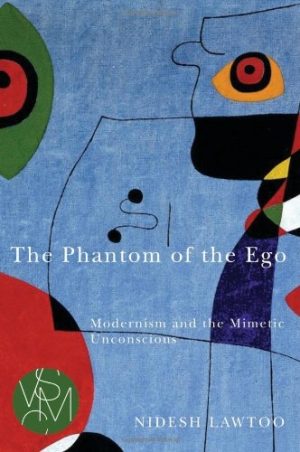It looks like you've stumbled upon a page meant to be read by our code instead of viewed directly. You're probably looking for this page.
Phantom of the Ego
Modernism and the Mimetic Unconscious
Picture yourself in the early twentieth century, fully alive and engaged with the modernist movement’s flowering in the arts, literature, and psychology. Here’s the catch: imagine that the Father of Modernism, Sigmund Freud, didn’t exist. How would our ideas of the unconscious mind, the modern psyche, look without Freud’s psychoanalytical infant/Oedipal/repressed configurations?
Mind blowing, actually.
In The Phantom of the Ego, Nidesh Lawtoo wants us to call into question everything we think we know about the human ego: how it developed, what purpose it serves, how is it influenced, etc. He points to newborns showing imitative reflexes—a self-other connectedness—at thirty minutes of age, and reminds us that Freud had many contemporaries working on competing ideas of the human psyche. Nietzsche, especially, took a wildly different path; what he called the ego’s “phantom.” Lawtoo explains Nietzsche’s premise: “this phantom is born out of an unconscious process of psychic ‘communication’ that spreads contagiously from self to others, one head to another head, depriving ‘the great majority’ of their own thoughts, values, and opinions and, thus, turning their ego into what he calls, once again, a ‘phantom of the ego.’”
In addition to Nietzsche, Lawtoo pens chapters on other Modernist explorers, including Joseph Conrad, D. H. Lawrence, and Georges Bataille.
Lawtoo’s purpose is not to knock Freud from his lofty place—but, obviously, human consciousness, the supposed pinnacle of the evolutionary process, as well as Eastern ideas of duality, may have some more ’splaining to do.
Reviewed by
Matt Sutherland
Disclosure: This article is not an endorsement, but a review. The publisher of this book provided free copies of the book to have their book reviewed by a professional reviewer. No fee was paid by the publisher for this review. Foreword Reviews only recommends books that we love. Foreword Magazine, Inc. is disclosing this in accordance with the Federal Trade Commission’s 16 CFR, Part 255.
